Reflective Journal on Indigenous Communities and the Police
VerifiedAdded on 2021/02/20
|6
|1557
|92
Journal and Reflective Writing
AI Summary
This reflective journal examines the complex relationship between Indigenous communities and policing, focusing on the impact of colonisation on Aboriginal and Torres Strait Islander people and their interactions with law enforcement. It explores the historical context of colonisation, its negative effects on the relationship between police and Indigenous communities, and contemporary debates surrounding the policing of Indigenous peoples. The journal critiques current police policies, highlighting issues such as over-representation in the justice system, inappropriate behaviour, and harsh treatment. It also discusses government responses, including justice reinvestment initiatives and the importance of mutual respect agreements, cultural awareness, and community interactions to improve relations. The journal references key studies and publications to support its arguments, providing a comprehensive overview of the challenges and potential solutions in the field of Indigenous policing, offering valuable insights for criminal justice practitioners.
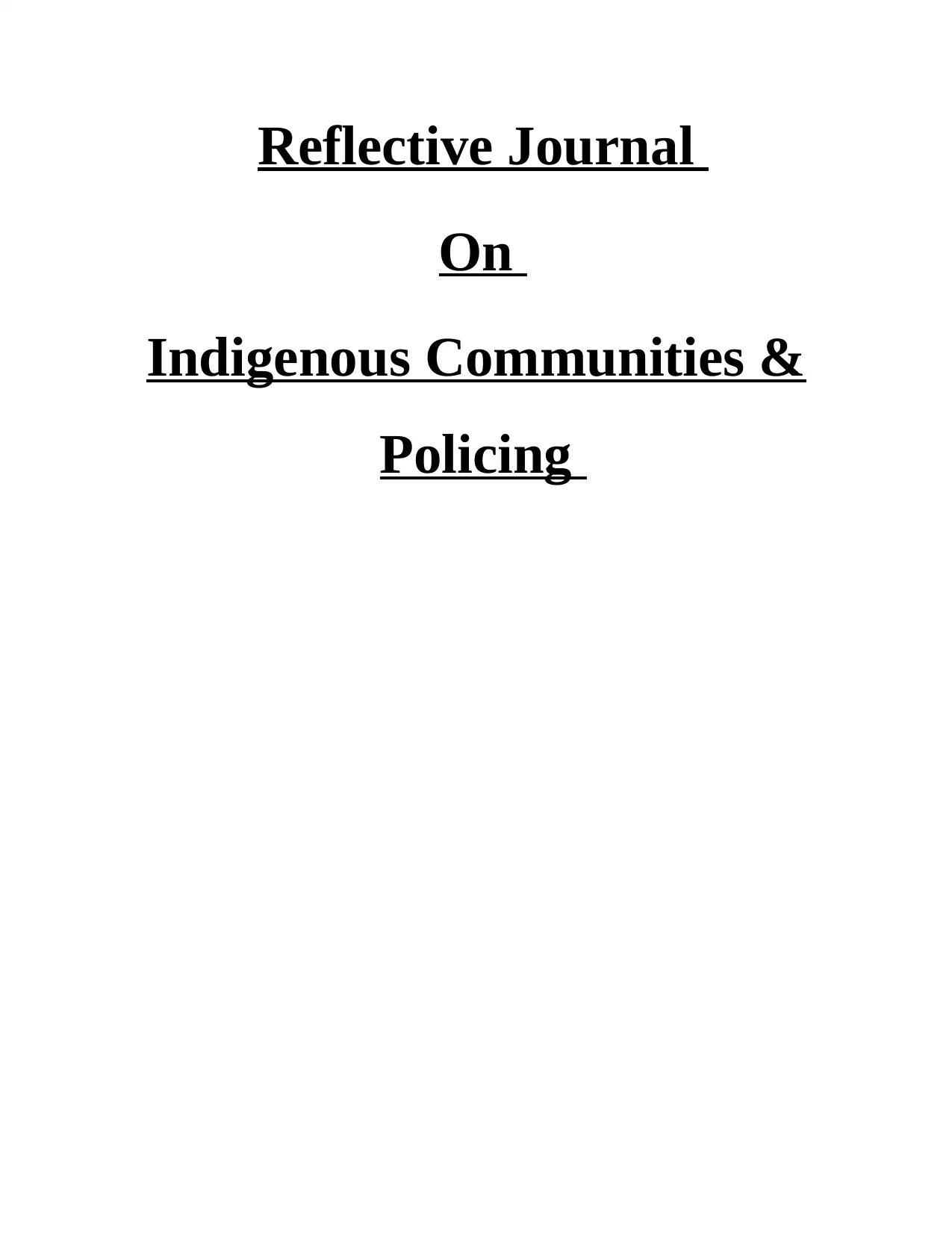
Reflective Journal
On
Indigenous Communities &
Policing
On
Indigenous Communities &
Policing
Paraphrase This Document
Need a fresh take? Get an instant paraphrase of this document with our AI Paraphraser
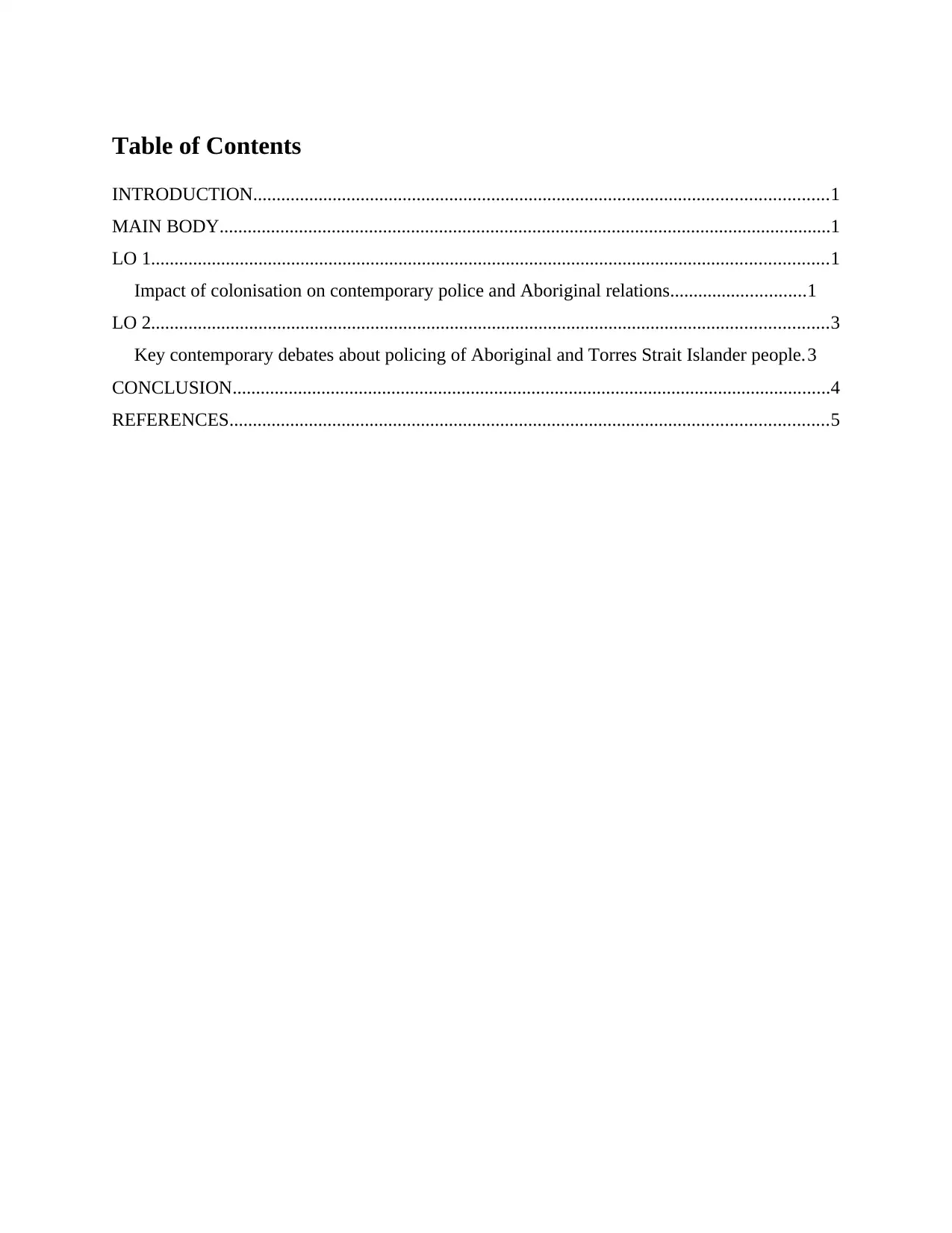
Table of Contents
INTRODUCTION...........................................................................................................................1
MAIN BODY...................................................................................................................................1
LO 1.................................................................................................................................................1
Impact of colonisation on contemporary police and Aboriginal relations.............................1
LO 2.................................................................................................................................................3
Key contemporary debates about policing of Aboriginal and Torres Strait Islander people.3
CONCLUSION................................................................................................................................4
REFERENCES................................................................................................................................5
INTRODUCTION...........................................................................................................................1
MAIN BODY...................................................................................................................................1
LO 1.................................................................................................................................................1
Impact of colonisation on contemporary police and Aboriginal relations.............................1
LO 2.................................................................................................................................................3
Key contemporary debates about policing of Aboriginal and Torres Strait Islander people.3
CONCLUSION................................................................................................................................4
REFERENCES................................................................................................................................5
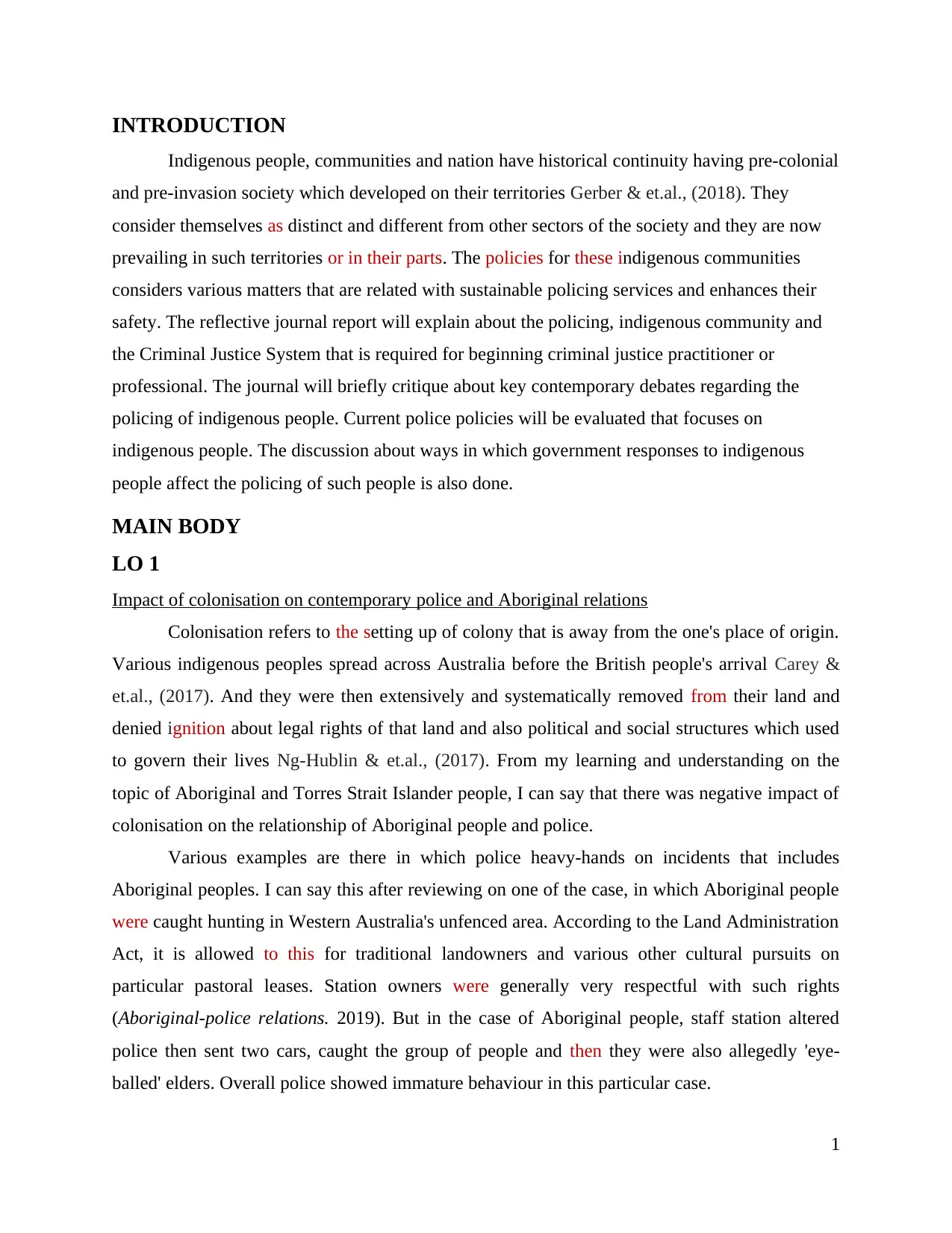
INTRODUCTION
Indigenous people, communities and nation have historical continuity having pre-colonial
and pre-invasion society which developed on their territories Gerber & et.al., (2018). They
consider themselves as distinct and different from other sectors of the society and they are now
prevailing in such territories or in their parts. The policies for these indigenous communities
considers various matters that are related with sustainable policing services and enhances their
safety. The reflective journal report will explain about the policing, indigenous community and
the Criminal Justice System that is required for beginning criminal justice practitioner or
professional. The journal will briefly critique about key contemporary debates regarding the
policing of indigenous people. Current police policies will be evaluated that focuses on
indigenous people. The discussion about ways in which government responses to indigenous
people affect the policing of such people is also done.
MAIN BODY
LO 1
Impact of colonisation on contemporary police and Aboriginal relations
Colonisation refers to the setting up of colony that is away from the one's place of origin.
Various indigenous peoples spread across Australia before the British people's arrival Carey &
et.al., (2017). And they were then extensively and systematically removed from their land and
denied ignition about legal rights of that land and also political and social structures which used
to govern their lives Ng-Hublin & et.al., (2017). From my learning and understanding on the
topic of Aboriginal and Torres Strait Islander people, I can say that there was negative impact of
colonisation on the relationship of Aboriginal people and police.
Various examples are there in which police heavy-hands on incidents that includes
Aboriginal peoples. I can say this after reviewing on one of the case, in which Aboriginal people
were caught hunting in Western Australia's unfenced area. According to the Land Administration
Act, it is allowed to this for traditional landowners and various other cultural pursuits on
particular pastoral leases. Station owners were generally very respectful with such rights
(Aboriginal-police relations. 2019). But in the case of Aboriginal people, staff station altered
police then sent two cars, caught the group of people and then they were also allegedly 'eye-
balled' elders. Overall police showed immature behaviour in this particular case.
1
Indigenous people, communities and nation have historical continuity having pre-colonial
and pre-invasion society which developed on their territories Gerber & et.al., (2018). They
consider themselves as distinct and different from other sectors of the society and they are now
prevailing in such territories or in their parts. The policies for these indigenous communities
considers various matters that are related with sustainable policing services and enhances their
safety. The reflective journal report will explain about the policing, indigenous community and
the Criminal Justice System that is required for beginning criminal justice practitioner or
professional. The journal will briefly critique about key contemporary debates regarding the
policing of indigenous people. Current police policies will be evaluated that focuses on
indigenous people. The discussion about ways in which government responses to indigenous
people affect the policing of such people is also done.
MAIN BODY
LO 1
Impact of colonisation on contemporary police and Aboriginal relations
Colonisation refers to the setting up of colony that is away from the one's place of origin.
Various indigenous peoples spread across Australia before the British people's arrival Carey &
et.al., (2017). And they were then extensively and systematically removed from their land and
denied ignition about legal rights of that land and also political and social structures which used
to govern their lives Ng-Hublin & et.al., (2017). From my learning and understanding on the
topic of Aboriginal and Torres Strait Islander people, I can say that there was negative impact of
colonisation on the relationship of Aboriginal people and police.
Various examples are there in which police heavy-hands on incidents that includes
Aboriginal peoples. I can say this after reviewing on one of the case, in which Aboriginal people
were caught hunting in Western Australia's unfenced area. According to the Land Administration
Act, it is allowed to this for traditional landowners and various other cultural pursuits on
particular pastoral leases. Station owners were generally very respectful with such rights
(Aboriginal-police relations. 2019). But in the case of Aboriginal people, staff station altered
police then sent two cars, caught the group of people and then they were also allegedly 'eye-
balled' elders. Overall police showed immature behaviour in this particular case.
1
⊘ This is a preview!⊘
Do you want full access?
Subscribe today to unlock all pages.

Trusted by 1+ million students worldwide
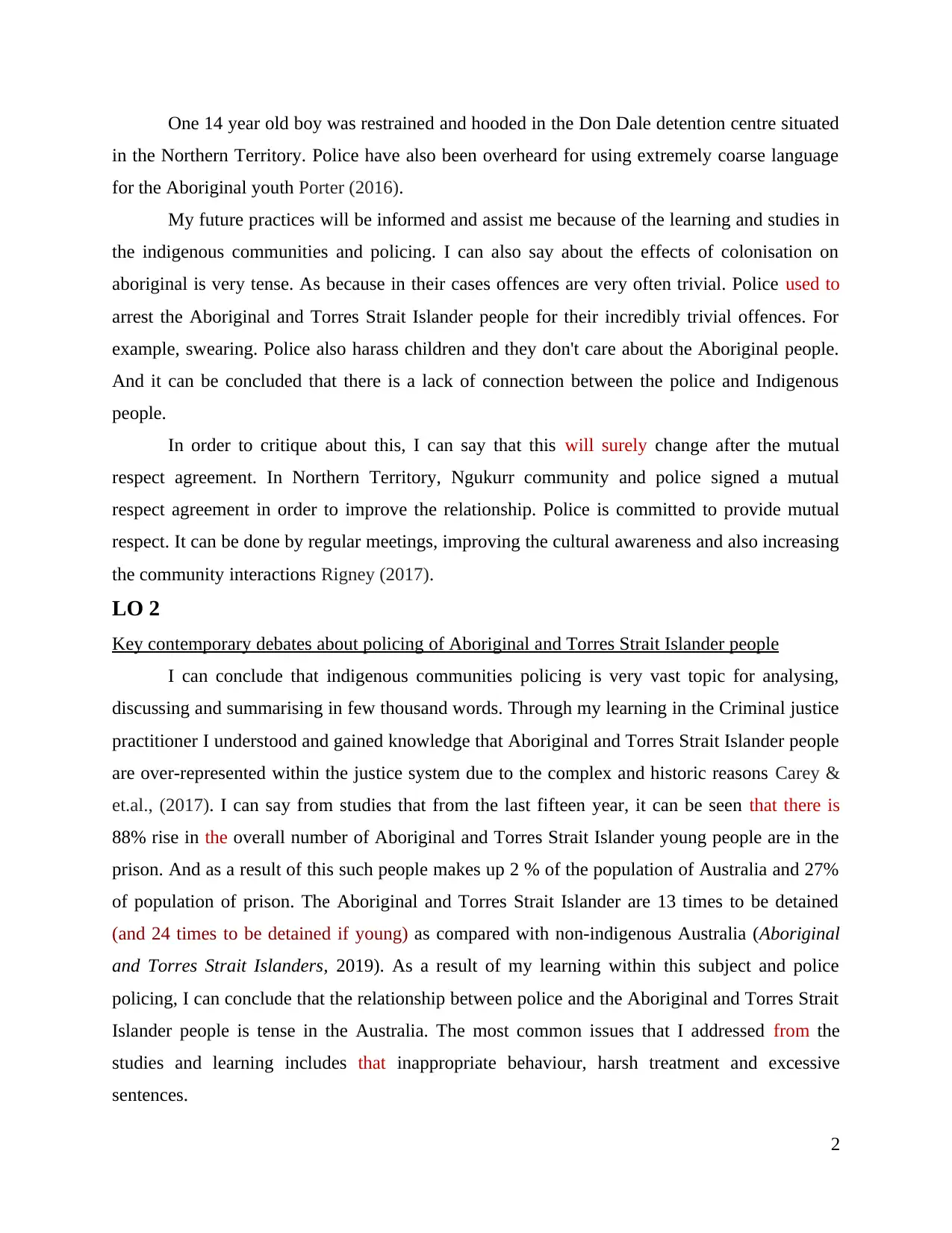
One 14 year old boy was restrained and hooded in the Don Dale detention centre situated
in the Northern Territory. Police have also been overheard for using extremely coarse language
for the Aboriginal youth Porter (2016).
My future practices will be informed and assist me because of the learning and studies in
the indigenous communities and policing. I can also say about the effects of colonisation on
aboriginal is very tense. As because in their cases offences are very often trivial. Police used to
arrest the Aboriginal and Torres Strait Islander people for their incredibly trivial offences. For
example, swearing. Police also harass children and they don't care about the Aboriginal people.
And it can be concluded that there is a lack of connection between the police and Indigenous
people.
In order to critique about this, I can say that this will surely change after the mutual
respect agreement. In Northern Territory, Ngukurr community and police signed a mutual
respect agreement in order to improve the relationship. Police is committed to provide mutual
respect. It can be done by regular meetings, improving the cultural awareness and also increasing
the community interactions Rigney (2017).
LO 2
Key contemporary debates about policing of Aboriginal and Torres Strait Islander people
I can conclude that indigenous communities policing is very vast topic for analysing,
discussing and summarising in few thousand words. Through my learning in the Criminal justice
practitioner I understood and gained knowledge that Aboriginal and Torres Strait Islander people
are over-represented within the justice system due to the complex and historic reasons Carey &
et.al., (2017). I can say from studies that from the last fifteen year, it can be seen that there is
88% rise in the overall number of Aboriginal and Torres Strait Islander young people are in the
prison. And as a result of this such people makes up 2 % of the population of Australia and 27%
of population of prison. The Aboriginal and Torres Strait Islander are 13 times to be detained
(and 24 times to be detained if young) as compared with non-indigenous Australia (Aboriginal
and Torres Strait Islanders, 2019). As a result of my learning within this subject and police
policing, I can conclude that the relationship between police and the Aboriginal and Torres Strait
Islander people is tense in the Australia. The most common issues that I addressed from the
studies and learning includes that inappropriate behaviour, harsh treatment and excessive
sentences.
2
in the Northern Territory. Police have also been overheard for using extremely coarse language
for the Aboriginal youth Porter (2016).
My future practices will be informed and assist me because of the learning and studies in
the indigenous communities and policing. I can also say about the effects of colonisation on
aboriginal is very tense. As because in their cases offences are very often trivial. Police used to
arrest the Aboriginal and Torres Strait Islander people for their incredibly trivial offences. For
example, swearing. Police also harass children and they don't care about the Aboriginal people.
And it can be concluded that there is a lack of connection between the police and Indigenous
people.
In order to critique about this, I can say that this will surely change after the mutual
respect agreement. In Northern Territory, Ngukurr community and police signed a mutual
respect agreement in order to improve the relationship. Police is committed to provide mutual
respect. It can be done by regular meetings, improving the cultural awareness and also increasing
the community interactions Rigney (2017).
LO 2
Key contemporary debates about policing of Aboriginal and Torres Strait Islander people
I can conclude that indigenous communities policing is very vast topic for analysing,
discussing and summarising in few thousand words. Through my learning in the Criminal justice
practitioner I understood and gained knowledge that Aboriginal and Torres Strait Islander people
are over-represented within the justice system due to the complex and historic reasons Carey &
et.al., (2017). I can say from studies that from the last fifteen year, it can be seen that there is
88% rise in the overall number of Aboriginal and Torres Strait Islander young people are in the
prison. And as a result of this such people makes up 2 % of the population of Australia and 27%
of population of prison. The Aboriginal and Torres Strait Islander are 13 times to be detained
(and 24 times to be detained if young) as compared with non-indigenous Australia (Aboriginal
and Torres Strait Islanders, 2019). As a result of my learning within this subject and police
policing, I can conclude that the relationship between police and the Aboriginal and Torres Strait
Islander people is tense in the Australia. The most common issues that I addressed from the
studies and learning includes that inappropriate behaviour, harsh treatment and excessive
sentences.
2
Paraphrase This Document
Need a fresh take? Get an instant paraphrase of this document with our AI Paraphraser
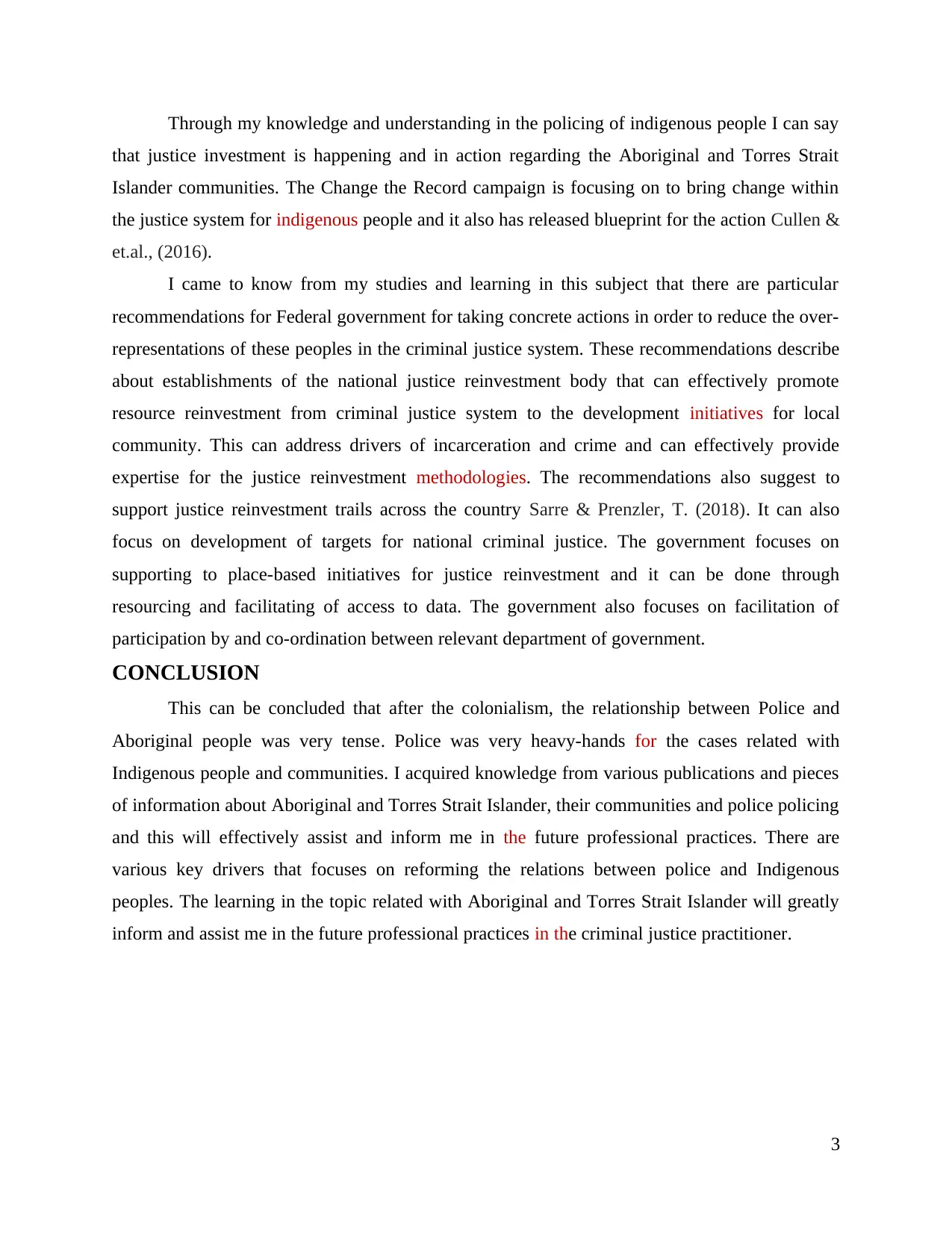
Through my knowledge and understanding in the policing of indigenous people I can say
that justice investment is happening and in action regarding the Aboriginal and Torres Strait
Islander communities. The Change the Record campaign is focusing on to bring change within
the justice system for indigenous people and it also has released blueprint for the action Cullen &
et.al., (2016).
I came to know from my studies and learning in this subject that there are particular
recommendations for Federal government for taking concrete actions in order to reduce the over-
representations of these peoples in the criminal justice system. These recommendations describe
about establishments of the national justice reinvestment body that can effectively promote
resource reinvestment from criminal justice system to the development initiatives for local
community. This can address drivers of incarceration and crime and can effectively provide
expertise for the justice reinvestment methodologies. The recommendations also suggest to
support justice reinvestment trails across the country Sarre & Prenzler, T. (2018). It can also
focus on development of targets for national criminal justice. The government focuses on
supporting to place-based initiatives for justice reinvestment and it can be done through
resourcing and facilitating of access to data. The government also focuses on facilitation of
participation by and co-ordination between relevant department of government.
CONCLUSION
This can be concluded that after the colonialism, the relationship between Police and
Aboriginal people was very tense. Police was very heavy-hands for the cases related with
Indigenous people and communities. I acquired knowledge from various publications and pieces
of information about Aboriginal and Torres Strait Islander, their communities and police policing
and this will effectively assist and inform me in the future professional practices. There are
various key drivers that focuses on reforming the relations between police and Indigenous
peoples. The learning in the topic related with Aboriginal and Torres Strait Islander will greatly
inform and assist me in the future professional practices in the criminal justice practitioner.
3
that justice investment is happening and in action regarding the Aboriginal and Torres Strait
Islander communities. The Change the Record campaign is focusing on to bring change within
the justice system for indigenous people and it also has released blueprint for the action Cullen &
et.al., (2016).
I came to know from my studies and learning in this subject that there are particular
recommendations for Federal government for taking concrete actions in order to reduce the over-
representations of these peoples in the criminal justice system. These recommendations describe
about establishments of the national justice reinvestment body that can effectively promote
resource reinvestment from criminal justice system to the development initiatives for local
community. This can address drivers of incarceration and crime and can effectively provide
expertise for the justice reinvestment methodologies. The recommendations also suggest to
support justice reinvestment trails across the country Sarre & Prenzler, T. (2018). It can also
focus on development of targets for national criminal justice. The government focuses on
supporting to place-based initiatives for justice reinvestment and it can be done through
resourcing and facilitating of access to data. The government also focuses on facilitation of
participation by and co-ordination between relevant department of government.
CONCLUSION
This can be concluded that after the colonialism, the relationship between Police and
Aboriginal people was very tense. Police was very heavy-hands for the cases related with
Indigenous people and communities. I acquired knowledge from various publications and pieces
of information about Aboriginal and Torres Strait Islander, their communities and police policing
and this will effectively assist and inform me in the future professional practices. There are
various key drivers that focuses on reforming the relations between police and Indigenous
peoples. The learning in the topic related with Aboriginal and Torres Strait Islander will greatly
inform and assist me in the future professional practices in the criminal justice practitioner.
3
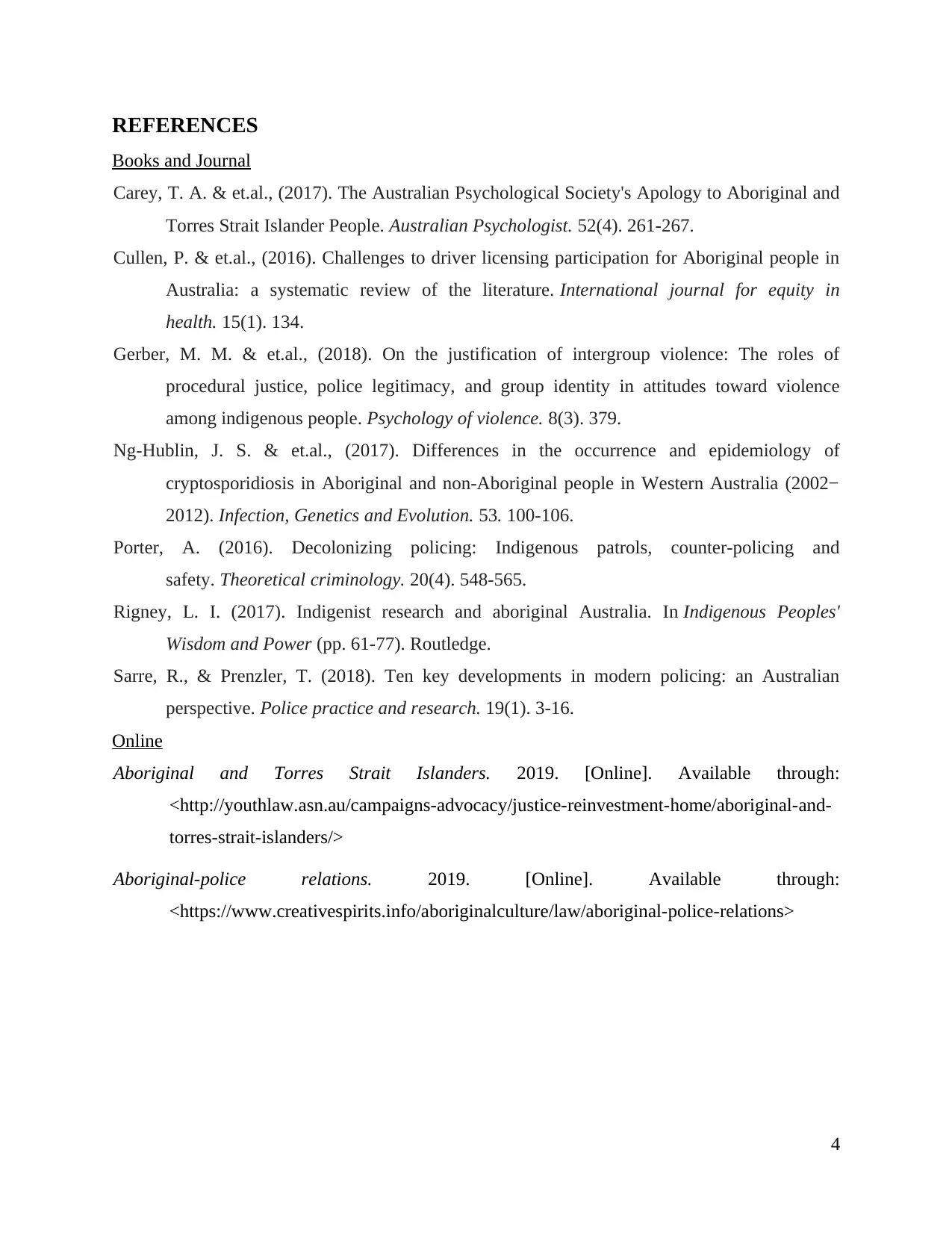
REFERENCES
Books and Journal
Carey, T. A. & et.al., (2017). The Australian Psychological Society's Apology to Aboriginal and
Torres Strait Islander People. Australian Psychologist. 52(4). 261-267.
Cullen, P. & et.al., (2016). Challenges to driver licensing participation for Aboriginal people in
Australia: a systematic review of the literature. International journal for equity in
health. 15(1). 134.
Gerber, M. M. & et.al., (2018). On the justification of intergroup violence: The roles of
procedural justice, police legitimacy, and group identity in attitudes toward violence
among indigenous people. Psychology of violence. 8(3). 379.
Ng-Hublin, J. S. & et.al., (2017). Differences in the occurrence and epidemiology of
cryptosporidiosis in Aboriginal and non-Aboriginal people in Western Australia (2002−
2012). Infection, Genetics and Evolution. 53. 100-106.
Porter, A. (2016). Decolonizing policing: Indigenous patrols, counter-policing and
safety. Theoretical criminology. 20(4). 548-565.
Rigney, L. I. (2017). Indigenist research and aboriginal Australia. In Indigenous Peoples'
Wisdom and Power (pp. 61-77). Routledge.
Sarre, R., & Prenzler, T. (2018). Ten key developments in modern policing: an Australian
perspective. Police practice and research. 19(1). 3-16.
Online
Aboriginal and Torres Strait Islanders. 2019. [Online]. Available through:
<http://youthlaw.asn.au/campaigns-advocacy/justice-reinvestment-home/aboriginal-and-
torres-strait-islanders/>
Aboriginal-police relations. 2019. [Online]. Available through:
<https://www.creativespirits.info/aboriginalculture/law/aboriginal-police-relations>
4
Books and Journal
Carey, T. A. & et.al., (2017). The Australian Psychological Society's Apology to Aboriginal and
Torres Strait Islander People. Australian Psychologist. 52(4). 261-267.
Cullen, P. & et.al., (2016). Challenges to driver licensing participation for Aboriginal people in
Australia: a systematic review of the literature. International journal for equity in
health. 15(1). 134.
Gerber, M. M. & et.al., (2018). On the justification of intergroup violence: The roles of
procedural justice, police legitimacy, and group identity in attitudes toward violence
among indigenous people. Psychology of violence. 8(3). 379.
Ng-Hublin, J. S. & et.al., (2017). Differences in the occurrence and epidemiology of
cryptosporidiosis in Aboriginal and non-Aboriginal people in Western Australia (2002−
2012). Infection, Genetics and Evolution. 53. 100-106.
Porter, A. (2016). Decolonizing policing: Indigenous patrols, counter-policing and
safety. Theoretical criminology. 20(4). 548-565.
Rigney, L. I. (2017). Indigenist research and aboriginal Australia. In Indigenous Peoples'
Wisdom and Power (pp. 61-77). Routledge.
Sarre, R., & Prenzler, T. (2018). Ten key developments in modern policing: an Australian
perspective. Police practice and research. 19(1). 3-16.
Online
Aboriginal and Torres Strait Islanders. 2019. [Online]. Available through:
<http://youthlaw.asn.au/campaigns-advocacy/justice-reinvestment-home/aboriginal-and-
torres-strait-islanders/>
Aboriginal-police relations. 2019. [Online]. Available through:
<https://www.creativespirits.info/aboriginalculture/law/aboriginal-police-relations>
4
⊘ This is a preview!⊘
Do you want full access?
Subscribe today to unlock all pages.

Trusted by 1+ million students worldwide
1 out of 6
Related Documents
Your All-in-One AI-Powered Toolkit for Academic Success.
+13062052269
info@desklib.com
Available 24*7 on WhatsApp / Email
![[object Object]](/_next/static/media/star-bottom.7253800d.svg)
Unlock your academic potential
Copyright © 2020–2026 A2Z Services. All Rights Reserved. Developed and managed by ZUCOL.





